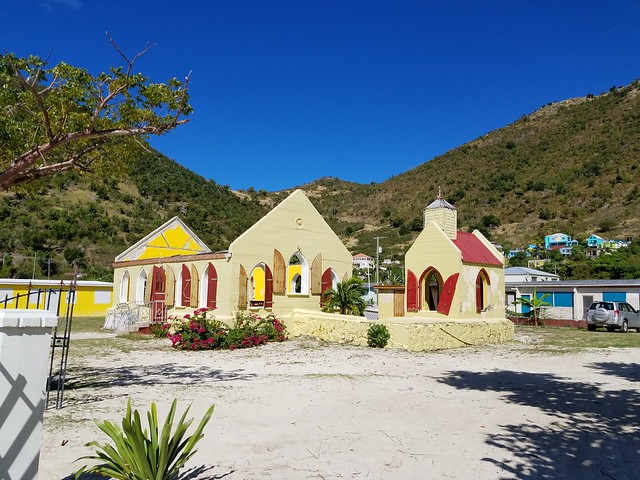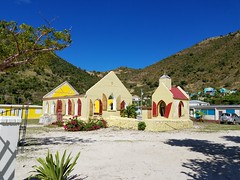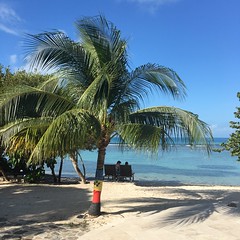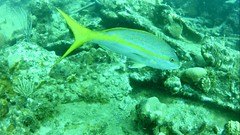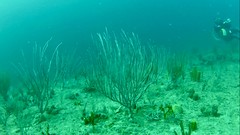 British Virgin Islands
British Virgin Islands
The British Virgin Islands (BVI), officially the Virgin Islands, are a British Overseas Territory in the Caribbean, to the east of Puerto Rico and the US Virgin Islands and north-west of Anguilla. The islands are geographically part of the Virgin Islands archipelago and are located in the Leeward Islands of the Lesser Antilles and part of the West Indies.
The British Virgin Islands consist of the main islands of Tortola, Virgin Gorda, Anegada and Jost Van Dyke, along with more than 50 other smaller islands and cays. About 16 of the islands are inhabited. The capital, Road Town, is on Tortola, the largest island, which is about long and wide. The islands had a population of 28,054 at the 2010 Census, of whom 23,491 lived on Tortola; current estimates put the population at 35,802 (July 2018).
British Virgin Islanders are British Overseas Territories citizens and since 2002, are also British citizens.
Etymology
The islands were named "Santa Úrsula y las Once Mil Vírgenes" by Christopher Columbus in 1493 after the legend of Saint Ursula and the 11,000 virgins. The name was later shortened to "the Virgin Islands".
The official name of the territory is still simply the "Virgin Islands", but the prefix "British" is often used. This is commonly believed to distinguish it from the neighbouring American territory which changed its name from the "Danish West Indies" to "Virgin Islands of the United States" in 1917. However, local historians have disputed this, pointing to a variety of publications and public records dating from between 21 February 1857 and 12 September 1919 where the territory is referred to as the British Virgin Islands. British Virgin Islands government publications continue to begin with the name "The territory of the Virgin Islands", and the territory's passports simply refer to the "Virgin Islands", and all laws begin with the words "Virgin Islands". Moreover, the territory's Constitutional Commission has expressed the view that "every effort should be made" to encourage the use of the name "Virgin Islands". But various public and quasi-public bodies continue to use the name "British Virgin Islands" or "BVI", including BVI Finance, BVI Electricity Corporation, BVI Tourist Board, BVI Athletic Association, BVI Bar Association and others.
In 1968 the British Government issued a memorandum requiring that the postage stamps in the territory should say "British Virgin Islands" (whereas previously they had simply stated "Virgin Islands"), a practice which is still followed today. This was likely to prevent confusion following on from the adoption of US currency in the territory in 1959, and the references to US currency on the stamps of the territory.
History
It is generally thought that the Virgin Islands were first settled by the Arawak from South America around 100 BC to AD 200, though there is some evidence of Amerindian presence on the islands as far back as 1500 BC. The Arawaks inhabited the islands until the 15th century when they were displaced by the more aggressive Caribs, a tribe from the Lesser Antilles islands.
The first European sighting of the Virgin Islands was by the Spanish expedition of Christopher Columbus in 1493 on his second voyage to the Americas, who gave the islands their modern name.
The Spanish Empire claimed the islands by discovery in the early 16th century, but never settled them, and subsequent years saw the English, Dutch, French, Spanish, and Danish all jostling for control of the region, which became a notorious haunt for pirates. There is no record of any native Amerindian population in the British Virgin Islands during this period; it is thought that they either fled to safer islands or were killed.
The Dutch established a permanent settlement on the island of Tortola by 1648, frequently clashing with the Spanish who were based on nearby Puerto Rico. In 1672, the English captured Tortola from the Dutch, and the English annexation of Anegada and Virgin Gorda followed in 1680. Meanwhile, over the period 1672–1733, the Danish gained control of the nearby islands of Saint Thomas, Saint John and Saint Croix (i.e. the modern US Virgin Islands).
The British islands were considered principally a strategic possession. The British introduced sugar cane which was to become the main crop and source of foreign trade, and large numbers of slaves were forcibly brought from Africa to work on the sugar cane plantations. The islands prospered economically until the middle of the nineteenth century, when a combination of the abolition of slavery in the British Empire in 1834, a series of disastrous hurricanes, and the growth in the sugar beet crop in Europe and the United States significantly reduced sugar cane production and led to a period of economic decline.
In 1917, the United States purchased the Danish Virgin Islands for US$25 million, renaming them the United States Virgin Islands. Economic linkages with the US islands prompted the British Virgin Islands to adopt the US dollar as its currency in 1959.
The British Virgin Islands were administered variously as part of the British Leeward Islands or with St. Kitts and Nevis, with an administrator representing the British Government on the islands. The islands gained separate colony status in 1960 and became autonomous in 1967 under the new post of Chief Minister. Since the 1960s, the islands have diversified away from their traditionally agriculture-based economy towards tourism and financial services, becoming one of the wealthiest areas in the Caribbean. The constitution of the islands was amended in 1977, 2004 and 2007, giving them greater local autonomy.
In 2017 Hurricane Irma struck the islands, causing four deaths and immense damage.
Geography
The British Virgin Islands comprise around 60 tropical Caribbean islands, ranging in size from the largest, Tortola, being long and wide, to tiny uninhabited islets, altogether about in extent. They are located in the Virgin Islands archipelago, a few miles east of the US Virgin Islands, and about from the Puerto Rican mainland. About east south-east lies Anguilla. The North Atlantic Ocean lies to the east of the islands, and the Caribbean Sea lies to the west. Most of the islands are volcanic in origin and have a hilly, rugged terrain. The highest point is Mount Sage on Tortola at 521m. Anegada is geologically distinct from the rest of the group, being a flat island composed of limestone and coral. The British Virgin Islands contain the Leeward Islands moist forests and Leeward Islands xeric scrub terrestrial ecoregions.
Demographics
As of the 2010 Census, the population of the territory was 28,054. Estimates put the population at 35,800 (July 2018) yet in 2022, it is thought to be much less than 30,000 post-Irma and with people having left during COVID lockdowns due to unemployment in the tourism industry. The majority of the population (76.9%) are , descended from slaves brought to the islands by the British. Other large ethnic groups include Latinos (5.6%), those of European ancestry (5.4%), Mixed ancestry (5.4%) and Indian (2.1%).
The 2010 Census reports:
- 76.9% African
- 5.6% Hispanic
- 5.4% European/Caucasian
- 5.4% Mixed
- 2.1% East Indian
- 4.6% Others*
The 2010 Census reports the main places of origin of residents as follows:
- 39.1% local born (though note that many locals go to St. Thomas or the United States for maternity services)
- 7.2% Guyana
- 7.0% St. Vincent and the Grenadines
- 6.0% Jamaica
- 5.5% United States
- 5.4% Dominican Republic
- 5.3% United States Virgin Islands
The islands are heavily dependent upon migrant labour. In 2004, migrant workers accounted for 50% of the total population. 32% of workers employed in the British Virgin Islands work for the government.
Unusually, the territory has one of the highest drowning mortality rates in the world, being higher than other high-risk countries such as China and India. 20% of deaths in the British Virgin Islands during 2012 were recorded as drownings, all of them being tourists. Despite this, the territory's most popular beach still has no lifeguard presence.
Religion
Over 90% of the population who indicated a religious affiliation at the 2010 Census were Christian with the largest individual Christian denominations being Methodist (17.6%), Anglican (9.5%), Church of God (10.4%), Seventh-Day Adventists (9.0%) and Roman Catholic (8.9%). The largest non-Christian faiths in 2010 were Hinduism (1.9%) and Islam (0.9%). However Hindus and Muslims constitute each approximately 1.2% of the population according to Word Religion Database 2005.
The Constitution of the British Virgin Islands commences with a professed national belief in God.
| 2010 | 2001 | 1991 | |
|---|---|---|---|
| Methodist | 17.6 | 22.7 | 32.9 |
| Church of God | 10.4 | 11.4 | 9.2 |
| Anglican | 9.5 | 11.6 | 16.7 |
| Seventh Day Adventist | 9.0 | 8.4 | 6.3 |
| Roman Catholic | 8.9 | 9.5 | 10.5 |
| Pentecostal | 8.2 | 9.1 | 4.1 |
| None | 7.9 | 6.4 | 3.6 |
| Baptist | 7.4 | 8.2 | 4.7 |
| Other | 4.1 | 3.4 | 4.4 |
| Jehovah's Witnesses | 2.5 | 2.2 | 2.1 |
| Not stated | 2.4 | 2.7 | 1.1 |
| Hindu | 1.9 | 2.0 | 2.2 |
| Muslim | 0.9 | 0.9 | 0.6 |
| Evangelical | 0.7 | 0.5 | – |
| Rastafarian | 0.6 | 0.4 | 0.2 |
| Moravian | 0.3 | 0.5 | 0.6 |
| Presbyterian | 0.2 | 0.4 | 0.7 |
| Buddhist | 0.2 | - | - |
| Jewish | 0.04 | - | - |
| Bahai | 0.04 | 0.03 | 0.00 |
| Brethren | - | 0.03 | 0.04 |
| Salvation Army | - | 0.03 | 0.04 |
Culture
Language
The primary language is English, although there is a local dialect. Spanish is spoken by Puerto Rican, Dominican and other Hispanic immigrants.
Music
The traditional music of the British Virgin Islands is called fungi after the local cornmeal dish with the same name, often made with okra. The special sound of fungi is due to a unique local fusion between African and European music. It functions as a medium of local history and folklore and is therefore a cherished cultural form of expression that is part of the curriculum in BVI schools. The fungi bands, also called "scratch bands", use instruments ranging from calabash, washboard, bongos and ukulele, to more traditional western instruments like keyboard, banjo, guitar, bass, triangle and saxophone. Apart from being a form of festive dance music, fungi often contains humorous social commentaries, as…
